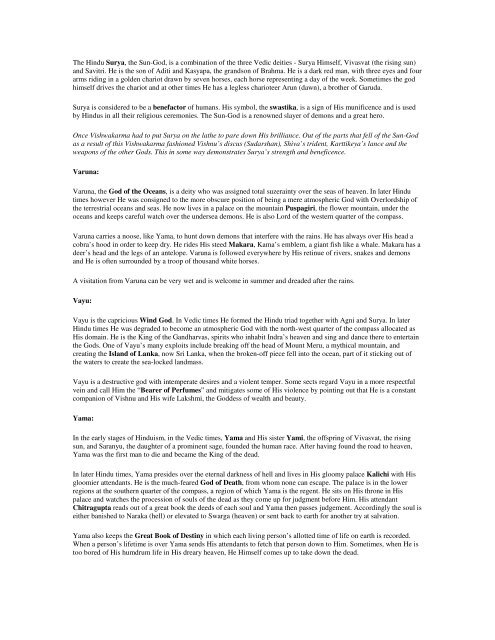You also want an ePaper? Increase the reach of your titles
YUMPU automatically turns print PDFs into web optimized ePapers that Google loves.
The Hindu Surya, the Sun-God, is a combination of the three Vedic deities - Surya Himself, Vivasvat (the rising sun)<br />
and Savitri. He is the son of Aditi and Kasyapa, the grandson of Brahma. He is a dark red man, with three eyes and four<br />
arms riding in a golden chariot drawn by seven horses, each horse representing a day of the week. Sometimes the god<br />
himself drives the chariot and at other times He has a legless charioteer Arun (dawn), a brother of Garuda.<br />
Surya is considered to be a benefactor of humans. His symbol, the swastika, is a sign of His munificence and is used<br />
by Hindus in all their religious ceremonies. The Sun-God is a renowned slayer of demons and a great hero.<br />
Once Vishwakarma had to put Surya on the lathe to pare down His brilliance. Out of the parts that fell of the Sun-God<br />
as a result of this Vishwakarma fashioned Vishnu’s discus (Sudarshan), Shiva’s trident, Karttikeya’s lance and the<br />
weapons of the other Gods. This in some way demonstrates Surya’s strength and beneficence.<br />
Varuna:<br />
Varuna, the God of the Oceans, is a deity who was assigned total suzerainty over the seas of heaven. In later Hindu<br />
times however He was consigned to the more obscure position of being a mere atmospheric God with Overlordship of<br />
the terrestrial oceans and seas. He now lives in a palace on the mountain Puspagiri, the flower mountain, under the<br />
oceans and keeps careful watch over the undersea demons. He is also Lord of the western quarter of the compass.<br />
Varuna carries a noose, like Yama, to hunt down demons that interfere with the rains. He has always over His head a<br />
cobra’s hood in order to keep dry. He rides His steed Makara, Kama’s emblem, a giant fish like a whale. Makara has a<br />
deer’s head and the legs of an antelope. Varuna is followed everywhere by His retinue of rivers, snakes and demons<br />
and He is often surrounded by a troop of thousand white horses.<br />
A visitation from Varuna can be very wet and is welcome in summer and dreaded after the rains.<br />
Vayu:<br />
Vayu is the capricious Wind God. In Vedic times He formed the Hindu triad together with Agni and Surya. In later<br />
Hindu times He was degraded to become an atmospheric God with the north-west quarter of the compass allocated as<br />
His domain. He is the King of the Gandharvas, spirits who inhabit Indra’s heaven and sing and dance there to entertain<br />
the Gods. One of Vayu’s many exploits include breaking off the head of Mount Meru, a mythical mountain, and<br />
creating the Island of Lanka, now Sri Lanka, when the broken-off piece fell into the ocean, part of it sticking out of<br />
the waters to create the sea-locked landmass.<br />
Vayu is a destructive god with intemperate desires and a violent temper. Some sects regard Vayu in a more respectful<br />
vein and call Him the “Bearer of Perfumes” and mitigates some of His violence by pointing out that He is a constant<br />
companion of Vishnu and His wife Lakshmi, the Goddess of wealth and beauty.<br />
Yama:<br />
In the early stages of <strong>Hinduism</strong>, in the Vedic times, Yama and His sister Yami, the offspring of Vivasvat, the rising<br />
sun, and Saranyu, the daughter of a prominent sage, founded the human race. After having found the road to heaven,<br />
Yama was the first man to die and became the King of the dead.<br />
In later Hindu times, Yama presides over the eternal darkness of hell and lives in His gloomy palace Kalichi with His<br />
gloomier attendants. He is the much-feared God of Death, from whom none can escape. The palace is in the lower<br />
regions at the southern quarter of the compass, a region of which Yama is the regent. He sits on His throne in His<br />
palace and watches the procession of souls of the dead as they come up for judgment before Him. His attendant<br />
Chitragupta reads out of a great book the deeds of each soul and Yama then passes judgement. Accordingly the soul is<br />
either banished to Naraka (hell) or elevated to Swarga (heaven) or sent back to earth for another try at salvation.<br />
Yama also keeps the Great Book of Destiny in which each living person’s allotted time of life on earth is recorded.<br />
When a person’s lifetime is over Yama sends His attendants to fetch that person down to Him. Sometimes, when He is<br />
too bored of His humdrum life in His dreary heaven, He Himself comes up to take down the dead.
















